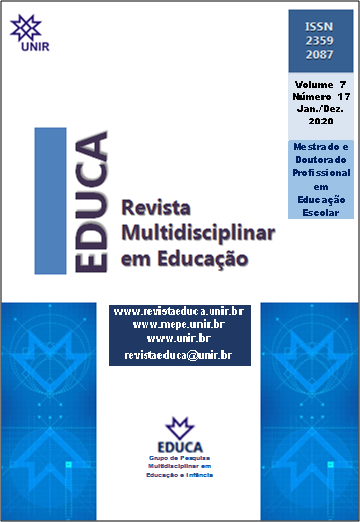Official documents: an analysis of the guidelines for the science teaching of the 9th year of elementary school
DOI:
https://doi.org/10.26568/2359-2087.2020.4327Keywords:
Science teaching. Official documents. Curriculum. Modernity. Postmodernity.Abstract
The present research is part of a master's thesis, whose object of research is the curricular practices developed in Science Teaching of the 9th grade of Elementary School, in some schools of a city in south of Rio Grande do Sul, we present in this text, a documentary analysis on National Curricular Parameters, Study Plan of Elementary School - Final Years and National Curricular Common Base. We believe that these documents are the basis of the school curricula and talking from the perspective of a postmodern education and science, we aim to present the general characteristics of the documents in question, discuss skills, abilities and objectives, discuss curricular structures and distributions of the contents of the discipline of Science of the 9th year of Elementary School. The Plan of the municipality structures the teaching of Sciences of the 9th year in the same way that was historically constructed, being divided in the fundamentals of chemistry and physics. In contrast, the National Curricular Parameters does not determine the configuration of the contents. The BNCC points to an attempt to integrate knowledge. We understand that the three official documents present weaknesses and potentialities that are part of the current scenario of Science Teaching.
References
ANDERY, Maria Amalia. Para compreender a ciência: uma perspectiva histórica. Rio de Janeiro: Garamond, 1980.
BRASIL, Lei de Diretrizes e Bases. Lei nº 9.394/96, de 20 de dezembro de 1996.
BRASIL, Lei de Diretrizes e Bases. Lei nº 13.415/17, de 16 de fevereiro de 2017.
BRASIL, Ministério da Educação. Governo Federal. Base Nacional Comum Curricular. MEC, 2018.
BRASIL, Ministério da Educação. Secretária de Educação. Parâmetros Curriculares Nacionais. MEC, 1997.
DELIZOICOV, Demétrio; ANGOTTI, José; PERNAMBUCO, Marta. Ensino de Ciências: fundamentos e métodos. 4. ed. São Paulo: Cortez, 2011.
GATTI, Bernadete. Pesquisa, educação e pós-modernidade: confrontos e dilemas. Cadernos de Pesquisa, v. 35, n126, p. 595-608, 2005.
GIL, Antônio. Métodos e técnicas de pesquisa social. 6. ed. São Paulo: Atlas, 2014.
LOPES, Cesar. As Ciências Naturais na escola: espaço de integração? In: FILIPONSKI; Ana M. R; SCHAFFER, Neiva O; MARCHI, Diana M. (orgs.). Teorias e fazeres na escola em mudança. Porto Alegre: UFRGS, 2005.
LYOTARD, Jean-François. A condição pós-moderna. Rio de Janeiro, José Olympio, 2009.
LYOTARD, Jean François. O Pós-Moderno. Rio de Janeiro: José Olympio, 1988.
MAGALHÃES, Joanalira; RIZZA, Juliana; OLIVEIRA, Lucilaine. Metodologias para o ensino de Ciências: (Re) pensando propostas para a construção de conhecimentos. In: RIBEIRO, Paula; MAGALHÃES, Joanalira (orgs.). Ensino de Ciências: outros olhares, outras possibilidades. Rio Grande: FURG, 2014.
PACHECO, José. Área de projecto: Uma componente curricular não-disciplinar. In: LOPES, Alice; MACEDO, Elizabeth (orgs.). Disicplinas e integração curricular: história e políticas. Rio de Janeiro: DP&A, 2002.
RIO GRANDE, Secretária Municipal de Educação. Plano de Estudos – Ensino Fundamental – Anos finais. 2015.
SILVA, Tomas. Documentos de Identidade: uma introdução às teorias do currículo. 3. ed. Belo Horizonte: Autêntica, 2010.
SILVA, Tomaz. O Adeus as metanarrativas educacionais. In: ______ (org.). O Sujeito da Educação: estudos foucaultianos. Petrópolis: Vozes, 2010.
SILVA, Tomaz. O projeto educacional moderno: identidade terminal? In: VEIGA-NETO, Alfredo (org.). Crítica Pós-estruturalista e educação. Porto Alegre: Sulina, 1995.
VEIGA-NETO, Alfredo. De geometrias, currículo e diferenças. Educação & Sociedade, ano XXIII, nº 79, Agosto/2002.
WORTMANN, Maria. Localizando o ensino de Ciências na instrução escolar do Rio Grande do Sul. Episteme, Porto Alegre, n. 9, 1999.
Downloads
Published
Issue
Section
License
Autores que publicam nesta revista concordam com os seguintes termos:
a) Autores mantém os direitos autorais e concedem à revista o direito de primeira publicação, com o trabalho simultaneamente licenciado sob a Licença Creative Commons Attribution que permite o compartilhamento do trabalho com reconhecimento da autoria e publicação inicial nesta revista.
b) Autores têm autorização para assumir contratos adicionais separadamente, para distribuição não-exclusiva da versão do trabalho publicada nesta revista (ex.: publicar em repositório institucional ou como capítulo de livro), com reconhecimento de autoria e publicação inicial nesta revista.
c) Autores têm permissão e são estimulados a publicar e distribuir seu trabalho online (ex.: em repositórios institucionais ou na sua página pessoal) a qualquer ponto antes ou durante o processo editorial, já que isso pode gerar alterações produtivas, bem como aumentar o impacto e a citação do trabalho publicado (Veja O Efeito do Acesso Livre).



